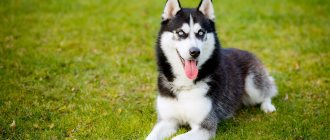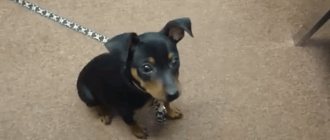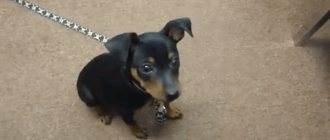Are Dobermans good family dogs? Most likely yes. Dobermans are highly intelligent, people-oriented, loyal, loving and protective dogs.
If attention is paid to early socialization and training, they can make excellent pets.
Although Dobermans generally make excellent, loyal pets, there are certainly differences in personality between individual Dobermans.
The key is to recognize a Doberman puppy that will grow up to work well in your family. Additionally, early exposure to small children and other pets will ensure a very well-rounded dog.
In the photo is my beloved dog Tsvetana, who unfortunately died.
Doberman Temperament Review
This is a general overview of the temperament and personality traits that are most common in a Doberman Pinscher to help you decide how he might fit into your family.
You may be in love with a breed, but don't be afraid to look for another breed if you don't think those traits will work well in your family.
High intelligence:
According to PetMD, Dobermans are among the top five smartest dog breeds in the world. This intelligence means that they are easy to train, but also easily bored. They will work well in an active family that still has rules and boundaries that need to be respected.
Loyalty:
these dogs are naturally incredibly loyal and bond very well with their family. They do have a tendency to pick one family member and bond exclusively with them, but they also enjoy being just "part of the pack."
People orientation:
Dobermans are very good with people and will look you straight in the eyes while you are talking to them. They are often called "Velcro" because they will always follow you everywhere. They are very adept at understanding what you expect from them, which is a great quality to have in a pet.
Loving and affectionate:
The modern Doberman can be as loving and affectionate as any lapdog. Be prepared for your 200-pound Doberman to climb into your lap at every opportunity and beg to let you sleep in your bed at night.
Protection:
Originally bred as personal protection dogs, Doberman Pinschers are excellent guard dogs. They will almost always sleep facing the door for safety reasons and will not hesitate to protect your family if necessary.
High demands on physical activity:
Since Dobermans are a working breed, they need a lot of exercise and do well in a home with a large fenced yard with plenty of room to run and play. This is a great quality if you have active kids who also benefit from getting tired in the backyard from time to time.
These traits are typical of Dobermans, but each dog does have its own unique personality.
pros
The positive qualities of the Doberman are:
- Service and security orientation;
- Devotion;
- Natural intelligence;
- Ability to learn;
- Strength and endurance;
- Universal content;
- Appearance.
The dog will be a vigilant guard. The breed is considered the best of guard dogs. Shows courage and determination in the face of danger. It senses a scent, so it is often used by the police for search activities.
The animal will be devoted to the owner and his family. With proper upbringing, the owner will be regarded as a leader. A small child in a family is regarded as a playmate. The dog will guard the baby, but will not obey the child’s commands.
Thoroughbred individuals are naturally intelligent, capable of learning any commands. A trained dog maintains discipline and obeys its owner. Training is required, otherwise behavior problems are guaranteed.
Dobermans are strong and resilient and can cope with physical stress, which is why they are valued as service dogs.
Possible maintenance in a private or apartment building.
Has an elite appearance and article. The appearance encourages many to get this dog.
Dobermans in the family
Overall, these dogs are very versatile and can adapt to a wide variety of situations. Their intelligence and how attuned they are to people helps with this. By nature, Doberman Pinschers are pack animals and love the feeling of belonging to a family or group.
You will find that any Doberman you own will quickly become attached to your family and they don't like to be away from the group.
In fact, the Doberman loves the feeling of being with the pack so much that it is often possible to walk them off-leash on a regular basis. Of course, this depends on the training the dog receives and its environment.
If well socialized from an early age, Dobermans are also excellent with children, can work well with many other pets, will be protective of the family, and make an excellent loyal companion.
What to look for when choosing
It's no secret that choosing a puppy for yourself is not an easy task. After all, they are very cute, which complicates the process of identifying from all the swarming variety the ideal candidate for the role of friend and protector. Therefore, you need to know how to choose a Doberman puppy, because a dog of this breed is versatile and can perform several functions.
It is best to choose a pet together with a specialist (a friend who breeds this breed, or a dog handler). This is the only way to choose a truly healthy and purebred dog. It is worth choosing a puppy from a well-known nursery. There you can get all the necessary documents for the animal, as well as check the pedigree and visually evaluate the parents. You can also find out useful information from breeders regarding the conditions of keeping and caring for your pet. At the same time, you can evaluate how well the animals are looked after in the nursery itself.
Dobermans and children
Doberman Pinschers tend to get along well with the children they are raised with. They are excellent at being gentle and tolerant with small children and babies.
They can also get along well with all children if they are socialized from an early age. We'll talk more about how to properly socialize them later in this article.
The Doberman is an affectionate dog.
They love to give and receive. Dobermans were bred to be very people-oriented, which has the effect of being an affectionate dog. These dogs really appreciate hugs, endless caresses and kisses on the face. In fact, your Doberman may require affection too often. Free them from their children and they will get all the love they can handle.
Doberman is a good defender
Because Dobermans were originally bred as personal protection dogs, they have a natural instinct to protect their owners. This is especially true for anyone whose dog spends a lot of time with them, and I'm willing to bet that your kids will spend a lot of time with your Doberman. Without any training, Dobermans will naturally spring into action if your children are in danger.
Tolerance
If raised correctly, they can be incredibly tolerant of their family members. Poking, prodding, rough hugs from an excited child - none of this will affect your Doberman. Just make sure they get used to it from an early age.
Exercise Partners: This is a working dog breed and they tend to have endless energy, which is great if you have restless children.
In fact, Dobermans need plenty of exercise throughout the day to keep them happy, so close relationships with active children tend to benefit both the children and the dog. TO
When a dog is well trained, you will find that you can leave him home alone for longer periods of time, they tend to be less destructive (especially during teething) and generally healthier.
Main classes
At the moment, dogs of this breed are divided into three main classes:
- Pat. It implies animals that are in good health but have a certain defect. This defect prevents the dogs from meeting the standard specified for this breed. Also, such animals cannot be used for breeding or take part in exhibitions;
- brid. A class that fully complies with the standard. Therefore, such dogs are participants in exhibitions and are allowed for breeding;
- show. Puppies of this class are characterized by ideal pedigree and conformation. It is representatives of this class that most often become exhibition winners. Therefore, the cost of such a puppy will be the highest.
The class is determined only when the puppy is 1–1.5 months old. Previously, it was impossible to make an exact division, since the breed qualities of babies have not yet been fully revealed. Weaning puppies from their mother without harm to their psyche is possible at the age of 1.5–2 months.
Dobermans with other animals
Any pets that your Doberman is used to, or better yet, grown up with, will be fine. However, problems arise when you introduce an adult dog to a small furry pet.
Large barnyard animals are fine, but you will need to keep a close eye on your dog first. If they appear scared or protective around the animal (this can be the case with very large animals such as horses), this could spell disaster.
With other dogs:
Doberman Pinschers usually get along well in the home with other dogs of the opposite sex. If you must have two dogs of the same sex in your home, females usually get along better with other females.
However, two male Dobermans, or even one male Doberman and one male of any other breed, can be a difficult situation.
While dog breeds that are the same size as your Doberman are best, owners have also found success raising Dobermans with much smaller dogs in the same household.
I have written another article on this topic which includes a compatibility list for Dobermans and small dogs here.
With cats:
There doesn't seem to be a rule that applies to Dobermans in general regarding how they get along with cats, and it seems to depend on the individual dog's temperament.
They are both natural predators, which really helps them get along, but the cat is small and furry, which is one of the worst types of animals you can encounter with a Doberman.
To answer this question, iHeartDogs.com conducted a survey of Doberman Pins owners. In the survey, 28% said their Doberman gets along very well with cats, 47% said they get along “okay,” and 25% said they don’t get along very well.
If you can introduce your Doberman to your cat while he is still a puppy, you will have a much better chance of success.
For more information about how well cats and Dobermans get along, including the best way to introduce them for the first time, see the article Can Dobermans Get Along with Cats?.
With other types of pets: Although each dog's personality is different, they generally get along well with other large animals. It can then handle horses and other large farm animals well if presented correctly.
However, Dobermans do not generally get along well with smaller, furry pets such as guinea pigs, hamsters, rabbits and ferrets.
Doberman owners report some success when introducing their dogs to rabbits at a young age, but introducing an adult Doberman to any of these common pets can have disastrous consequences.
The best chance of getting your Doberman to get along with any other pet is to introduce him at a young age. The younger the better, so that when they become strong and strong adults, they become accustomed to your pets and don't feel the instinct to hunt or chase them.
How to choose a puppy
The future owner of a Doberman usually has an idea of what kind of dog he wants to see next to him.
One needs an affectionate companion, and he chooses a female. Another person needs a strong and formidable protector and acquires a male dog. They take the choice of a pet seriously. First, they decide on a nursery. You can also buy a puppy from friends who have bred at home. The baby will grow up to be a loyal friend, but mental problems may arise as an adult. A kennel that breeds several breeds of dogs is also not a good choice.
In such a place it is difficult to pay due attention to the breeding of each of the breeds contained.
Doberman puppies
IMPORTANT! Experienced dog breeders choose specialized nurseries where pairs are selected to produce animals while maintaining the necessary qualities characteristic of purebred Dobermans
But even for such nurseries there are some signs that you need to pay attention to. Table 1
What to look for in a kennel when choosing a Doberman puppy?
Table 1
What to look for in a kennel when choosing a Doberman puppy?
| Sign or criterion for selecting a breeder | Fine | Badly |
| Place of birth of the puppy | The nursery that the future owner contacted | The puppy was brought from another place |
| Mother's age | Over 2 years old | Under 2 years old |
| How long ago did the mother have her previous litter? | No more than 1 year ago | More than 1 year ago |
| What is the litter size of the puppy's mother? | Fourth or more | Third or less |
| Documents for the puppy describing its health and breed information | Documents provided | Documents not provided |
| Documents for parents describing their health and breed information | Documents provided | Documents not provided |
| Photos of puppies from previous litters | Available. This means that the breeder maintains contact with his clients | No photos |
| Socialization | The puppy was given classes and accustomed to children and other animals. | A negative or vague answer indicates that the puppy has not been handled. |
| Condition in enclosures | Purely | Dirty |
You definitely should not take a puppy if the nursery has not provided documents or the baby was born in another place.
Signs to look out for when choosing a puppy:
- Exterior. The puppy must show signs of purebred: wide back and chest, strong bones, wide jaws, dark eyes, square body.
- Health. The baby should be active, with clear eyes, a good appetite, shiny coat and bright tan.
- Vices. Deformed limbs, light eyes, light spots on the coat are reasons to refuse the purchase.
Healthy puppy
Early socialization is the key to success
Whether it's children, other dogs, or other types of pets, the underlying theme here is that early socialization is the key to success. When a Doberman is a young puppy, everything is interesting to him.
Exposing them to as many situations, people, and other animals as possible will help them become well-rounded adults.
This is especially true for children. When my Doberman was a little puppy, we brought as many children and other dogs as we could to him. He is very used to children petting him, pulling his ears, pulling his ears and worse.
Since all dogs can defend their food, my wife and I used to put our hands in his food bowl while he was eating, forcing him to stop eating and wait for us to remove our hands so he could continue.
He's now almost six years old, weighs about 90 pounds, and kids or anyone else just can't handle him. When it comes to children, he is the most gentle dog I have ever had.
They can tug and pull him as much as they want, and if it's too hard for him, he'll just walk away. Our child can put his hand in the bowl or even directly in his mouth while chewing on his favorite toy and it just won't give him pause.
He will immediately stop eating the food or chewing the toy and wait. I simply cannot stress enough the importance of early socialization for the Doberman.
Take him to the dog park, to family gatherings where there is a big loud group with a lot of people, let the neighborhood kids play with your sweet new puppy.
Just do as much as you can when they are young and you will have a gentle giant when they become adults.
Health
Dobermans have good health, but like every breed there are weaknesses: poor blood clotting, vision problems, hip dysplasia (especially older dogs), diseases of the thyroid gland and heart muscle. Albinism or even cancer occurs.
Another dangerous disease is narcolepsy. This is a condition in which the animal has little control over its sleep-wake transitions. In this case, the pet becomes lethargic, loses appetite and responds worse to commands.
Guard dog instincts
The Doberman Pinscher breed was originally created in the 1800s by a tax collector who needed a dog for personal protection while collecting taxes.
He had many qualities that he believed were ideal for a guard dog. As a result, Dobermans have a natural instinct to protect those they bond with.
However, modern Dobermans are much gentler than their counterparts many generations ago. Breeders have done a good job of breeding out some of the aggressive traits found in these dogs, even just a few decades ago.
They are now great family companions who love their owners, they are affectionate and love to cuddle but will certainly protect you.
Common Doberman defensive behaviors:
- Always sleeps facing the door or between you and the bedroom door.
- Stays close to you in new surroundings.
- Increased protective instincts when approaching large people and animals.
- Heightened protective instincts when people approach you with a large stick or other dangerous objects in their hands.
You will probably notice that your Doberman will always sleep facing the door to your room, so he is prepared for anything that comes through it. They will stick close to you, especially if they are with you in a new place or walking in a new area of town.
Even the most beautiful, well-socialized Doberman will become protective if it senses that its owner is in danger. They will do it wrong, and if they truly believe that you are in danger, you can expect your Doberman to sacrifice himself to protect you without a second thought.
There is a common myth about this breed that states that Dobermans are prone to sudden aggression towards their owners for no apparent reason.
Minuses
The disadvantage of Dobermans is manifested in:
- Stubbornness;
- Aggression;
- Excess - energy;
- Mandatory training;
- Exclusiveness of purpose.
The breed is distinguished by its stubbornness and willfulness. The pet will strive for leadership; males can mark their home territory. The owner's reputation must not be lost, otherwise the dog will become uncontrollable.
Dobermans are temperamental and pugnacious. Ill-mannered individuals have conflicts and will bully other animals and people. During walks, the pet must be muzzled. The dog responds to danger with aggression. When warning, it will not bark, but growl. The animal needs to spend time together with its owner. The dog cannot be kept on a chain, otherwise it will go wild.
Representatives of the breed need activity and physical exercise. The Doberman is low maintenance and requires vigorous play and long walks. The dog will not relieve himself in the litter box; walks are required. This individual will not make a lap dog.
Without training, the animal will pose a danger to others. The guard's innate instincts must be corrected. The puppy must be trained immediately. Dogs of this breed are easy to train and require the attention and time of the owner. The Doberman must be treated with severity, but not with cruelty; the dog can become embittered. Some owners turn to dog handlers for help.
https://dog-care.ru/porody/reyting/doberman-otzyvy-vladeltsev.html
The Doberman is designed for equally strong, strong-willed, energetic, and confident people. Not suitable for the elderly and children who are unable to cope with the pet's temper.
Often people who have failed to raise a pet speak poorly about the breed.
Exercise requirements
One of the most important aspects when deciding whether a Doberman is right for your family is to consider how active your family is. These dogs need a lot of exercise to keep them happy and relieve stress.
If your family is constantly walking or biking, hiking, or just running around playing outdoor games, then this would be a great dog for you. In fact, you may find that your Doberman will outplay your children and tire them out. If your family is less active and stays at home a lot, this may not be the best choice.
There are many dog breeds that are bred as companion dogs and they will be completely happy to spend hours relaxing on your lap in the house. The Doberman Pinscher is not one of them.
Possible disobedience
It must be remembered that when training a service dog, the main role belongs to the mentor, not the student.
Disobedience and failure to follow commands does not indicate stupidity of the pet. Impeccably training a dog requires considerable experience and diligence.
If your pet is uncontrollable, it is better to contact a specialist in the early stages. It is easier to correct behavioral difficulties at an early stage than to break the character of an adult Doberman.
Inexperienced owners may have the opinion that weekly attendance at special courses is sufficient for proper training.
A smart pet, under the guidance of professionals, will easily master the taught skills. It is up to the owner to practice the acquired knowledge in practice, in different settings.
As mentioned earlier, Dobermans are wise dogs that can easily be trained and, if handled properly, will not cause trouble for the owner.
The most important thing in a relationship with a pet is mutual respect. It is this quality that this dog breed will be able to appreciate most (more leadership, demandingness, affection)
Final thoughts
I am often asked for my opinion on Dobermans living in various situations and I can tell you that I have no hesitation in recommending Dobermans for families. They have so many qualities that make them work incredibly well in families and even with small children.
My decision to buy a Doberman for my family was the perfect decision for me. When I leave home, I like to know that my dog is there with my wife and kids.
When we have a big family and it's a big chaotic scene with lots of kids tugging and tugging at our dog, I'm so happy I have a gentle giant.
Do you know which Doberman is best for your family? To find out, read my article Doberman boy or Doberman girl - who is better to get?
Options
Let's start describing the breed with its appearance. The height of a male Doberman at the withers is 66-71 cm, that of a female is 61-66 cm. The weight of an adult is 30-40 kg. The head is narrow, elongated, the transition from the forehead to the muzzle is pronounced. The teeth are strong. The eyes are dark. Ears are erect. The neck is long and graceful. The tail is docked and set high. The withers of males usually protrude strongly, defining the direction from the croup to the back.
The body of the Doberman is short, but in females the lumbar region is longer, due to the need to have space for the mammary glands . The belly is noticeably tucked in. The coat is short, hard, lying close to the body. Color: black with brown markings, chocolate, blue; white Dobermans (albino Dobermans) with light fur and eyes are extremely rare.











